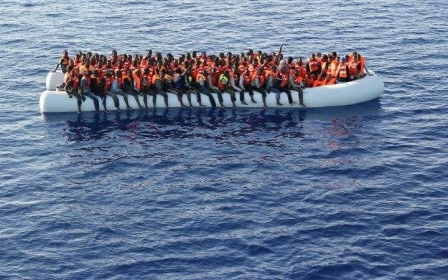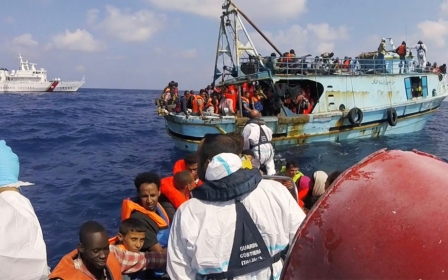Italy brokers deal with Libyan tribes to help curb migrant influx

The Italian government said on Sunday that dozens of rival tribes in southern Libya had agreed to cooperate on securing the country's borders in an effort to curb the influx of migrants trying to reach Europe.
Italy's interior ministry said the 60 tribal leaders - notably the Tuareg of the southwest, the Toubou of the southeast, and the Arab tribe of Awlad Suleiman - had reached the 12-point deal after 72 hours of secret talks in Rome.
A representative from Libya's UN-backed Government of National Accord, which is based in Tripoli and controls western Libya, was also present.
"A Libyan border patrol unit will be operational to monitor Libya's southern border of 5,000km," Italian Interior Minister Marco Minniti told Italy's La Stampa newspaper, one of several Italian media outlets reporting on the deal.
"Securing Libya's southern border means securing Europe's southern border," Minniti said.
Southern Libya is criss-crossed by smuggling routes for people, drugs and weapons. Since the 2011 uprising that ousted Muammar Gaddafi, a mosaic of tribal and ethnic forces is fighting for control of illicit trade and oil fields in the region.
Tuaregs control the border with southern Algeria, while farther east, the Toubou operate along the borders with Chad and Sudan.
Arab tribes have supported the authorities in western Libya, but they also maintain ties with a rival administration that holds sway in the east - and regularly clash with the Toubou.
Fayez al-Sarraj, chief of the fragile GNA, has struggled to impose the government's authority, despite its backing by many political and military leaders.
The accord, whose details have not yet been released, is the latest in a series of deals European countries have sought to reduce migration from Libya, which has increased sharply in recent months.
The deal aims to combat "an economy based on illicit drugs, which causes hundreds of deaths in the Mediterranean, thousands of desperate people looking for a better life, a populist push (in Europe) and a jihadist threat in the desert," according to the text of the agreement, quoted in the Corriere della Sera newspaper.
It also calls for job training programmes to keep young people from criminal activities.
Libya asked the EU last week to provide it with ships and radar to help its forces stop the smuggling of migrants across the Mediterranean, sources in Brussels told Reuters.
They said EU foreign ministers would review the "shopping list" at a meeting of foreign ministers in Luxembourg on 3 April, but would not be able to meet all the requests.
As part of an earlier agreement with the EU, about 90 members of the Libyan coastguard are currently completing training under the EU, and Italy is preparing to return 10 coastguard boats to Libya that it seized in 2011. They are expected to be operational by the end of April or in early May.
In March, interior ministers from several EU and North African countries reached a deal with the GNA to stem the flow of migrant and human smuggling, which included pledges of money, coastguard training and equipment for Libya.
About 24,200 people have been rescued from the Mediterranean and registered at Italian ports so far this year, according to the Interior Ministry.
New MEE newsletter: Jerusalem Dispatch
Sign up to get the latest insights and analysis on Israel-Palestine, alongside Turkey Unpacked and other MEE newsletters
Middle East Eye delivers independent and unrivalled coverage and analysis of the Middle East, North Africa and beyond. To learn more about republishing this content and the associated fees, please fill out this form. More about MEE can be found here.




